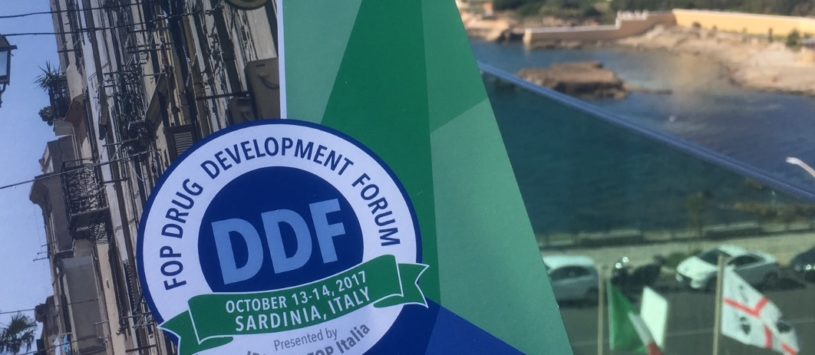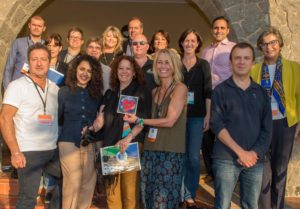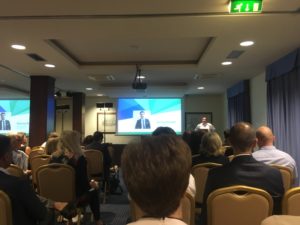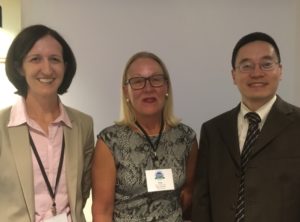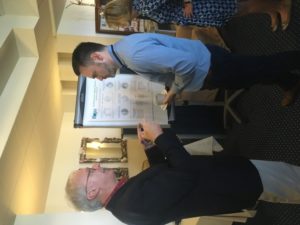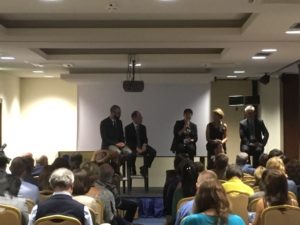The International Fibrodysplasia Ossificans Progressiva Association and FOP Italia 2017 Drug Development Forum was held in Alghero, Italy on the 12th and 13th of October. Over 180 people attended, including representatives from pharmaceutical companies, academic research centres and community organisations all around the world. FOP Australia congratulate our allies co-hosts IFOPA FOP Italia on a successful event at this pivotal time for the FOP community, and are excited to bring you the following news from the forum:
Drug development and clinical trials
- Clementia announced plans for phase III trial of palovarotene, beginning enrolment 2017. Planned for 18 sites across 14 countries, including Australia. Trial details are now online at https://clinicaltrials.gov/ct2/show/NCT03312634. The trial is still going through regulatory and planning stages in Australia – FOP Australia will keep you informed as more news becomes available.
- Clementia are preparing for public release of preliminary results from the phase II open label extension study of palovarotene.
- Regeneron announced further details of their phase 2 trial of anti-activinA REGN2477, planned to start enrolling in 2017! Currently no plans to enrol in Australia but FOP Australia will stay in touch for future opportunities.
- Professor Toguchida of Kyoto confirmed details of rapamycin trial in Japan planning to enrol 20 people with FOP at 4 sites within Japan. We look forward to results to help us learn more about the role of mTOR inhibition in potential FOP therapy.
- The potential for further assessment of saracatinib (based on foundational research), and of imatinib (based on case studies) was also discussed.
The start of the era of clinical trials in FOP is exciting, but also challenging for the international community. Like many rare diseases, there is limited capacity for the number of patients that can be enrolled in trials and studies need to be designed carefully to make sure the maximum possible benefit is gained from every person’s participation. The collaboration and commitment of the academic centres and companies is very encouraging in this regard, as demonstrated by the cooperation at the IFOPA Drug Development Forum where the need for responsible trial design was a recurring theme.
Another challenge in the era of clinical trials is ensuring people with FOP have the appropriate information to make decisions about whether they will participate in a trial. This has been identified by the IFOPA International Presidents’ Council and Research Committee as a current priority for the organisation.
Other developments in clinical care and monitoring
- The potential for PET scans in identifying sites of bone formation early in the flare process, as described by researcher from Amsterdam at the 2016 Boston DDF, has been recognised by the inclusion of this type of scan in the Regeneron trial.
- Dr Paul Yu at Harvard presented his work in mice with FOP that shows that voluntary exercise was associated with less bone development. Caution is required in applying this to humans, but it may be supportive of longstanding recommendations by international clinical leaders and many reports from those living with FOP that there may be some longterm benefits in optimising muscle function from gentle exercise.
- Work by Dr Ben Levi at the University of Michigan has begun exploring the role of specialised ultrasound in very early detection of bone formation. This raises the potential of a more accessible, radiation-free modality for clinical monitoring, if supported by further research.
- The 2nd annual report from the FOP Patient Registry was previewed in a poster session. The information gained from the registry will be a key component of future applications for drug approval by regulatory bodies, and crucial for future interpretation of drug trials. But it also describes important issue with the current clinical journey of FOP patients, including over half of patients receiving an incorrect diagnosis. This highlights the need for increased physician awareness of FOP to improve clinical care. This is recognised as a goal by IFOPA and in the current FOP Australia strategic plan.
- The DDF Q+A sessions and patient panel highlighted other clinical issues for the researchers present, to help them ensure work considers factors most important to those living with FOP. This included the frequent issues of pain management and fatigue.
- Professor Kaplan announced the formation of the International Clinical Council for FOP, a group of experts who will provide consensus and guidance. Queensland Univeristy of Technology’s Professor Matt Brown is a member of this group and attended the ICC meeting held following the DDF.
Alongside development of therapeutics there are several key areas of ongoing research that will need to guide clinical management of FOP, including the ongoing search for biomarkers to monitor progress and drug effect. This has been acknowledged at the forum as a priority for future study.
Foundational science
- Four 2017 IFOPA Competitive Research Grant winners were announced from a highly competitive field. This included a collaborative project between Dr Ed Hsiao of University of California, San Francisco and Dr Pam Yelick, Tuffs University on interrogating new FOP therapies using an in vivo zebrafish model. FOP Australia is very proud to sponsor this project which will not only learn more about specific drugs, but also enable a new way to safely understand other therapies in future studies as well.
- Other CRG winners include Dr Jay Groppe’s (Texas) innovative work on novel ways to stop new bone growth by destabilising the ALK2 receptor, analysis of ALK2 inhibitors by Dr Dan Perrien (Vanderbilt), and muscle regeneration in FOP Dr Yuji Mishina and Dr Ben Levi of Michigan
- Dr Eileen Shore from the University of Pennsylvania provided a detailed updated to the IFOPA research committee on the broad range of FOP-related research in her lab. This including many upcoming publications on understanding why and how new bone develops in FOP, and identifying targets for inhibiting this process.
- The role of macrophages in new bone development continues to be explored and researchers from many centres shared information about how the immune system may be involved in FOP.
- Other topics of foundational science presentations and discussion included ALK2 inhibition, BMP signalling pathways, and the role of progenitor cells andthe microenvironment in bone formation.
Associated meetings
To make the most of the opportunity to meet in person, meetings of the IFOPA International Presidents’ Council, the International Clinical Council and IFOPA Research Committee were held in Alghero, all attended by representatives from Australia. The meeting also provided an opportunity to share ideas and learnings with other community organisations, including many useful ideas for FOP Australia from our international friends on how to continue to grow and achieve our goals of supporting global FOP research and our local FOP community.
Notes provided by Dr Lydia Scott, chairperson and FOP Australia representative at the forum.
Disclosures: No disclosures or conflicts of interest to declare regarding pharmaceutical companies or involvement with participating academic centres. Accomodation was subsided by IFOPA. No FOP Australia funds were used to attend the forum.
Representatives from community organisations from 14 countries at the 2017 IFOPA International Presidents’ Council meeting.
Enrico Cristoforetti from co-hosts FOP Italia giving opening remarks of the IFOPA DDF to a packed room.
Two key contributors to the discovery of the FOP gene, Australia’s Professor Matt Brown from Queensland University of Technology and Professor Fred Kaplan from the University of Pennsylvania reunite at the International Clinical Council meeting in Alghero, Italy.
Chairperson Dr Lydia Scott congratulates A/Prof Ed Hsiao and Prof Pam Yelick on their IFOPA Competitive Research Grant, proudly sponsored by FOP Australia.
Neil Mantick explains the latest news from the FOP Connection Registry at the 2017 DDF.
Stelios Tsigkos the European Medicines Agency and Professor Fred Kaplan from University of Pennsylvania join a panel session to discuss presentations of the upcoming clinical trials: Donna Grogan (Clementia), Xiaobing Qian (Regeneron) and Professor Toguchida (University of Kyoto).

